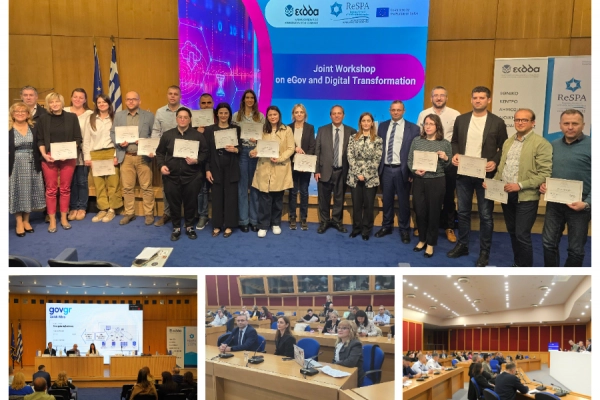
Workshop with EKDDA: Exploring Trends in Digital Governance and Effective e-Government Strategies
2-4 April 2025, Athens, Greece
ReSPA and the National Center for Public Administration and Local Government (EKDDA) provided invaluable opportunities for 20 public sector professionals, policymakers, and technology experts to exchange knowledge, share best practices, and engage in meaningful discussions on the future of digital governance and AI in public administration. Participants explored current trends in digital governance and the implementation of effective e-government strategies benefiting citizens and businesses.
Exarchos Vassileios, Vice President and acting president of EKDDA, Raptis Athanasios, Director, EKDDA, Ioannis Foustanakis, Secretary General of Ministry of Interior, Andreas Dimitrou, Director of GovGr, and Director Maja Handjiska Trendafilova emphasized the importance of hashtag#digitaltransformation in government and the crucial role of hashtag#capacitybuilding for civil servants in advancing digital services, as well as the importance of capacity-building of civil servants as an essential in advancing digital services. "With this study visit, our goal is to offer firsthand insights into Greece’s eGovernment framework and the EKDDA’s pivotal role in capacity building. Participants will have the opportunity to learn and exchange best practices in digital governance, effective e-government strategies, and their application in various public sector settings," said Director Handjiska-Trendafilova, expressing gratitude to EKDDA, the Ministry of Digital Governance, the Ministry of Interior, and GRNET for orchestrating a comprehensive agenda that highlights Greece’s remarkable digital transformation journey.
Attendees explored the development of www.gov.gr, Greece’s central digital services hub, designed to enhance accessibility and efficiency for citizens and businesses. The portal offers more than 2,160 services across 21 ministries, 100 organizations, 16 independent authorities, and 13 regions, categorized into 11 key areas. It also features a virtual assistant that provides real-time support to users navigating the platform. Andreas Dimitrou, Director of GovGr, presented the portal’s foundational principles and history, while Lilian Koutsona, Head of Unit at GovGr, detailed its user interface (UI) and user experience (UX). Experts from GRNET provided insights into critical aspects of digital governance: Theodoris Papadopoulos, IT Expert, discussed the European Digital Wallet and Cross-border Identities, Giorgos Tsoukalas outlined the GovGr backbone structure and technologies, while Alkistis Mouriki introduced AI in GovGr, focusing on the mAI gov Chat Bot.
On the second day, participants delved into digital governance and strategy at the Ministry of Digital Governance, where they heard from the Minister of Digital Governance, ministry representatives, and key stakeholders. Leading experts discussed how digital technologies reshape governance frameworks, exploring strategies for implementing large-scale digital initiatives and aligning them with national policy objectives. Christos Bouras, IT Expert in the Minister’s Cabinet, presented a mapping of the Digital Governance Ecosystem; Antonis Stasis, Director General of Digital Governance, elaborated on citizen authentication methods; Athanasios Valiakos, Director of Digital Strategy, showcased Greece’s Digital Transformation Strategy; Angelos Karvounis, Director of Interoperability, discussed interoperability governance and methodologies; Niki Tsouma, CEO of IDIKA, introduced the development of a pioneering Health Record & Subscription system and Chara Papadaki, Surveyor Engineer, MSc in Geoinformatics, presented the Digital Reform of the Hellenic Cadastre.
On the final day, participants explored technology's future through lectures and discussions on artificial intelligence, cybersecurity, and emerging technologies, focusing on AI’s transformative role in public administration, the critical importance of cybersecurity in protecting digital services, and the potential of new technologies to shape the future of governance.
Participants also learned about EKDDA’s educational programs and its training and development initiatives, designed to equip public sector professionals with the skills to navigate the digital landscape and implement effective solutions. Ioannis Mastrogeorgiou, Special Secretary of Foresight, presented the National AI Strategy, AI Legal Framework, and AI Act, Vasilis Karkatzounis, from the Cabinet of the Minister of Digital Governance, introduced Large Language Models (LLM), Vasiliki Margariti, IT Expert at the EU Permanent Representation, shared EU perspectives on AI (via Webex). Aris Meletiou, Director General of Cloud Policy, provided insights into governmental cloud computing, while Ioannis Alexakis, Director General of the National Cyber Security Agency, discussed national cybersecurity policies and legislation.
Prominent speakers additionally enriched comprehensive agenda: Dimosthenis Anagnostopoulos, Secretary General for Information System and Digital Governance of the Ministry Digital Governance, Ioannis Karagiannis, President of E-Governance Social Security Agency, Giorgos Korfiatis, GovGr Technical Manager at GRNET, Thomas Sioutis, Deputy Head of Digital Skills & Economy unit, Giorgos Katsikatsos, Director GRNET, Angelos Karvonuis, Head of Interoperability Unit, Adreas Pipis, Director General of Development and Support of Public Sector Information Systems, Elpida Fotiadou, Director of e-Health-IDIKA, Angeliki Bourbouli, Deputy director INEP.
Bojana Bajić, ReSPA Public Policies Innovations and Digitalization Officer, underlined: “Special thanks to the EKDDA team for the amazing support and warm hospitality and commitment to fostering this invaluable dialogue. Your efforts in leading digital transformation serve as an inspiration to all of us!
One of the key takeaways from this event has been the importance of collaboration, and the exchange of experiences, best practices, and lessons learned are invaluable in our shared mission to build modern, resilient, and interoperable public services.
The challenges ahead are complex, but by working together, we can accelerate digital transformation and ensure our institutions are prepared for the future. Moreover, exchanging ideas and experiences at this event has reinforced the importance of regional and international collaboration in driving digital innovation. As we move forward, it is clear that the success of digital governance is not solely dependent on technology but also on strategic planning, regulatory frameworks, and cooperation between governments, institutions, and experts”.
The event concluded with closing speeches and a certificate-awarding ceremony, marking the successful completion of a productive and insightful three-day study visit.



